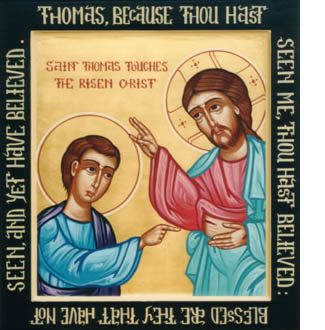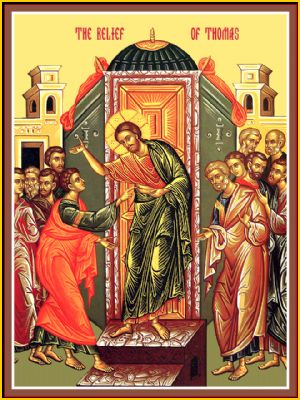|
|||
|---|---|---|---|
| This weekly bulletin insert complements the curriculum published by the Department of Christian Education of the Orthodox Church in America. This and many other Christian Education resources are available at http://dce.oca.org. | |||

Thomas will flee in fear when his Master suffers and dies. But like his fellow apostle Peter, he will find that Jesus' love never fails, even when his own courage fails miserably. We first meet Thomas when Jesus calls the twelve to follow Him, warning them of persecution and tribulation to come, and telling them they must depend on God for their sustenance. Thomas, like the other eleven, accepts this demanding responsibility. That in itself shows their love and loyalty to Christ. So many others abandon Jesus after hearing the "hard sayings" that He asks the twelve, in John 6:67, "Will you also go away?" Thomas shows his good intentions at another significant moment. When Jesus tells the apostles (John 11: 7) that he plans to return to Judea and Jerusalem, they remind Him that the people there recently wanted to stone Him. They ask incredulously, "Are You going there again?" Only Thomas, out of the whole group, pledges his loyalty and urges the others to be loyal by saying, "Let us go also, that we may die with Him." His impulse is to overcome fear and be true to his Lord. But of course, Thomas will not live up to his well-meaning words any more than Peter will fulfill his promise to accompany Christ to prison and to death. Thomas is mentioned again in John 20:24-29, eight days after Christ has appeared to the other apostles. We are not told why Thomas wasn't present at Christ's first appearance, just as we don't know who his twin was, though he is called "the Twin." We do know that when the others tell him they have seen Christ he is skeptical, and announces that he requires graphic physical proof if he is to believe. For eight days Thomas has to wait to see Christ, and during those long days he is not buoyed by the hope and certainty of the others who have already seen Him. Yet Thomas waits. He is rewarded by Christ's act of deep love. The Lord gives him permission to "reach your hand here and put in into My side." By saying this, Christ gives Thomas what he personally needs to confirm his faith. It is this act of loving understanding, rather than any actual touching, that empowers Thomas to proclaim, "My Lord and My God!"
History tells us that Thomas, having been shown such love and understanding of his personal need, grew into a great apostle. He traveled far, probably farther than any other apostle, to preach and teach. He was a great builder of churches and is called the patron saint of architects. Mary Magdalene needed only to hear the Lord say her name, that morning at the tomb, to know Him (John 20:16). Thomas needed much more. Christ fulfilled each of their needs, and they went on to be His powerful witnesses far beyond Palestine. That's what can happen to needy people when they respond sincerely to the One who, as our prayers tell us, knows what we need even before we ask. |
|||

